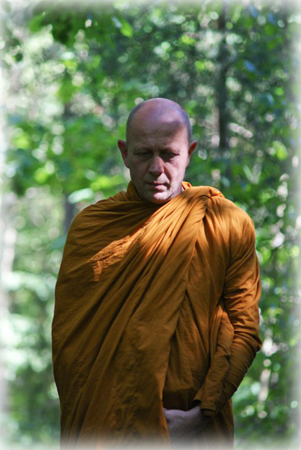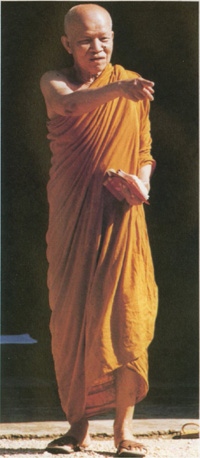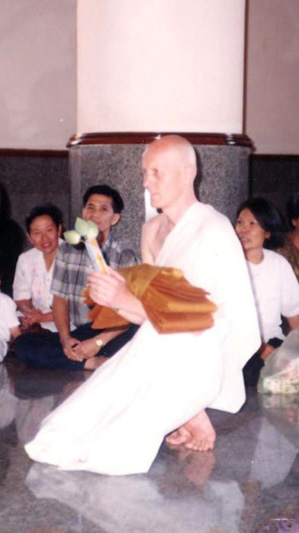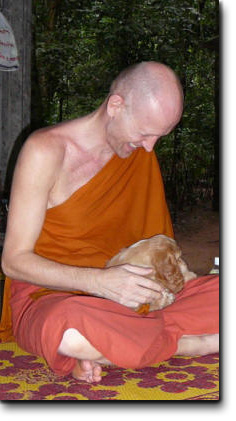Ajahn Martin Piyadhammo

Ajahn Martin Piyadhammo has lived as a Buddhist forest monk in jungles of Thailand for 20 years in the Thai Forest Tradition founded by Luangphu Mun (1870-1949). He stayed at Wat Pa Baan Taad for many years under the guidance of Luangta Mahā Bua (1913–2011) who was widely considered to be the successor of Lungphu Mun. Ordained in Thailand as a Buddhist monk in December 1995, he has lived there ever since, going on tudong (journeying alone in solitude through the forests) for a few months each year and meditating about 14 hours every day.
Martin was born in Stuttgart in 1957. From an early age, he had a penchant for tinkering with things, and he subsequently studied electrical engineering. With a Fulbright scholarship, he went to the USA to extend his studies to computer engineering and to work entirely in the university sector. After graduation, he worked in a research lab on image analysis and artificial intelligence in Hamburg. Also involved in the 'Scientists for Peace' campaign, he was earning enough money to be happy with his life. However, he was not. Instead, he felt dissatisfied, as if something was gnawing at his heart.
At the end of the 1980s, he discovered meditation. Soon after, he met his first meditation teacher - Vimalo Kulbarz, who taught him sitting and walking meditation in line with the Theravada tradition. At first, it was hell for him to sit still and watch his mind, but he stuck with it, and at the end of a ten-day meditation retreat with Vimalo Kulbarz he discovered a silence which filled him completely. "It was similar to coming out of a loud disco at three o'clock in the morning and finding oneself suddenly immersed in the silence of the street. Starry night is all around, the silence permeates everything, and the sound of the disco has fallen away ", he recalls. From this point onwards, he vowed to continue with the meditation practice that had given him such joy. He built his life around meditation, practicing in the morning by sitting one hour before going to work, and for one hour again in the evening.
In the summer of 1990, he again went on a retreat with Vimalo Kulbarz, at the end of which a kind of 'breakthrough' experience occurred, a state of inner rapture (piti) that can occur when the mind comes to rest. This experience lasted for three whole days, and was the decisive catalyst for dramatic change. Martin decided to go into homelessness, but making the decision was a terrible heartache; as he says, "Whenever I thought about it, it seemed like sharp needles were piercing my heart."
The two experiences of inner stillness and great joy, which deeply affected his heart, helped to sustain him on the path and to march forward without deviating, for they made the external sparkling world look pale by comparison. He still went to work, met friends and had a girlfriend, but none of these things had the same power to touch him, such was the experience of absolute silence and the 'uplift of the heart'. Finally, in March 1991, he decided to leave the research lab, gave away all his belongings and went into homelessness, i.e. without worldly goods and living in monasteries.
He needed to be able to focus fully on his practice. He realized that the meditation practice which he was doing regularly was still inadequate for the task. As Ajahn Martin explains, "Wisdom has to be developed, and it doesn't arise by thinking about this or that in the usual worldly way. Our thinking does not lead to insight; it remains stuck in the ordinary world, the world of ideas and concepts. Rather, we have to reach the heart (citta). A person who does not see through his worries, fears and troubles remains a prisoner of the darkness, for these are veils which cover and obscure our minds and hearts – and in darkness no realization is possible. In this darkness, we do not, in fact, rule our own lives, but are ruled by the defilements (kilesas) in our hearts. As long as we have not gained any clarity of mind, we will always be deceived by the false promises of the deceitful mind. We know that it does not make us happy when we give in to its enticements and promises, yet we follow them again and again. Maybe I would be happier in a new job? Maybe it would be easier not to tell the truth? Maybe today I should skip meditation and rest instead? With questions like these, we should ask ourselves, 'who is the one who suggests these things?' and 'where do these impulses come from?'. If we continue to ask such things persistently, always going back and anchoring ourselves on the mediation object, usually the breath as it comes in and out, then we will arrive suddenly at a point of certainty. We will reach the 'observer' who knows. Once we become one with this 'knowingness' in the state of deep samādhi, in absolute one-pointedness, then everything around us, including the world, disappears. If everything collapses into one point, duality ceases to exist".
It was this goal that Martin began to glimpse more clearly during the early stages of his practice, the goal that he desired to attain permanently.
For four years, he lived in various Theravada monasteries in England and with Ayya Khema at Buddha House in Germany. But he found that he barely had adequate time or opportunity to practice meditation, being involved in different activities. He also felt dissatisfied with the teaching he found in Europe. No one could show him the way to overcome greed and hatred.

It became clear to Martin that he would not reach his goal in the West. He had read the book, 'Straight from the Heart' from the famous meditation master Than Ajahn Mahā Bua who was abbot of the forest monastery at Baan Taad. Instinctively, he realized that Than Ajahn Mahā Bua knew the whole Truth, and that if he himself wanted to discover it, he would have to take him as a teacher. At that time, Wat Pa Baan Taad was known for being a very tough place and Than Ajahn Mahā Bua a very strict teacher.
In 1995, Martin flew to Thailand and arrived at Wat Pa Baan Taad. Residents in the monastery, mainly Buddhist monks, were expected to meditate all day long, and this was exactly Martin's burning desire. It was only after being accepted as a disciple by Than Ajahn Mahā Bua that he learned that this great teacher had not accepted any new Western students for more than a decade. Than Ajahn Mahā Bua made an exception for Martin, and told him on a later occasion, "I am your teacher. If you're going to drink coffee, just drink coffee and go back to your meditation. Do you understand?". Martin could not speak Thai at this time, but nevertheless the meaning became clear as Than Ajahn Mahā Bua spoke to him. It was also clear to Martin that he had come to the right place; his first meeting with Than Ajahn Mahā Bua was like coming home. "It was as if I had met my father and mother wrapped up in one person, and it was immediately clear that I was in the right place", he explains. After nine months in the forest monastery, Martin was ordained as a Buddhist monk (Bhikkhu) in December 1995, and has been a monk ever since. His monastic name is Than (Thai: venerable) Martin Piyadhammo, where 'Piyadhammo' is a Pali word that can be translated as 'the one who has perfect confidence in the Dhamma'.

He spent the first five years living inside the monastery walls, except for when he went on daily alms round in the local village or when he went to the city once a year to renew his visa. Meditation practice was no walk in the park, of course, but Than Martin went deeper and deeper into practice as the years progressed. If obstacles arose, and problems came up, he used his previous life experience to overcome them, reflecting that whatever he had experienced in his life prior to homelessness had led to nothing but dissatisfaction (dukkha). In ordinary life, he had never experienced the satisfaction and joy that came from meditation, so he reflected that it would not be sensible to return to the 'everyday' world of a layperson. "And if those reflections were ineffective", he says laughing, "I thought back to my childhood and youth. Would I want to repeat the confusions and torments of school or puberty? No thanks!". It was clear for him that he did not want to be reborn again.
These reflections were enough to make him continue practicing. His teacher, Than Ajahn Mahā Bua, was also doing his part. "He kept coming at the right moment ", Ajahn Martin recalls. "Sometimes I didn't see them [the kilesas coming up], of course, and then my teacher would point them out to me, sometimes not in a nice way, as if to say, "What the hell do you think you are doing, do you know yourself?" That was the way of his admonishment. He wasn't whispering, "Dear little brother, you have a black spot on your trousers, maybe you'd like to get rid of it?" He wasn't using soft language like that. Rather he used the language of the tiger, for if there are no tigers in the monastery the teacher has to be the tiger to scare the monks that dare to show off their kilesas."
When his five years of apprenticeship in the monastery were over, Than Martin went on 'tudong' ( journeying alone through the forests) around the surrounding provinces for two to five months each year, returning thereafter to Baan Taad forest monastery to live with his teacher. At first, he spent his periods of solitude at a very remote monastery, initially with five other monks but eventually with only one other monk. He preferred to be alone on tudong, spending time in caves located far away from the villages and largely undisturbed, so that his daily alms round might take from one to two and a half hours, depending on the location of the cave.
Even before becoming a monk, he had already a strong base of sati and samādhi. So his main focus was now on body contemplation and especially 'asubha' practice (seeing the loathsomeness of the body) using samādhi once in a while to rest the citta. In the forest tradition, the practice of asubha or seeing the loathsomeness of the body is one of the key practices to overcome sexual craving and greed and hatred. As Ajahn Martin explained in one of his talks: "I practiced meditation for 6 years in Europe and when I came here, I had to start anew. Because nobody was really teaching asubha in the West, nobody was really teaching how to get rid of the root of greed and hatred". He often teaches that this body is the pot where the plant of greed and hatred grows. Once we destroy the pot –i.e the body or our view about the body, the plant of greed and hatred has to die.

After 2002 an increasing number of German people came to visit Wat Pa Baan Taad . Ajahn Paññavaddho – who was responsible for instructing western lay visitors - asked Ajahn Martin to take on the instruction of these German visitors who wished to know more about the Dhamma. Two years later, in 2004, Ajahn Paññavaddho died, and the teaching of lay visitors was shared between Ajahn Dick and Ajahn Martin. After Ajahn Dick left the monastery in 2007, Ajahn Martin carried the sole responsibility for teaching lay visitors about Dhamma and meditation.
Since 2006, at the request of a group of western laypeople, the Dhamma talks of Ajahn Martin have been regularly recorded. This website now contains all of Ajahn Martin's recorded talks in English, German and Thai. Most of the talks from 2006 to 2017 were given to laypeople at Baan Taad Forest Monastery who wished to receive instruction on Dhamma and meditation. Most of the newer talks (from 2017 onwards) were given to laypeople and newly ordained western monks at Wat Phu Khong Tong (Nong Bua LamPhu province) where Ajahn Martin is currently vice abbot. These talks have not been corrected and therefore should not be transcribed or translated into another form without Ajahn Martin's written consent. If you have any questions about the content of the talks, please send an email to th.forest.dhamma@protonmail.com.